|
Somerset Beekeepers’ Association (SBKA) is calling on the public to help fight a major threat to honey bees and other pollinators - Asian hornets.
To date around 51 nests have been discovered in the UK so far this year, more than three times the number found in the last six years combined. Local beekeepers are concerned that these invasive predators will reach Somerset. There have been a number of unconfirmed sightings in the county. Lynne Ingram, SBKA’s Asian hornet team coordinator, said: “Asian hornets are wreaking havoc in Europe and, if they get established in the UK, our honey bees and many other insects will be decimated here, too.” Asian hornets (Vespa velutina) look like a large black wasp with yellow legs, an orange face, blackish brown body with a broad orangey yellow stripe towards the end of the abdomen. They are slightly smaller than native European hornets. Anyone who suspects they have seen an Asian hornet should report it immediately using the phone app ‘Asian Hornet Watch’ or the online reporting form: https://risc.brc.ac.uk/alert.php?species=asian_hornet Asian hornets are a non-native, invasive species and must be reported. Many nests have been found in patches of brambles and in hedgerows and there are fears that foragers enjoying the bumper blackberry crop and gardeners could inadvertently disturb a nest. Lynne added: “Foragers and gardeners should check hedges carefully to avoid disturbing an Asian hornet nest. Normally they don’t attack, but if you are near a nest, or disturb it, they can become extremely aggressive and dangerous.” A single nest can contain up to 6,000 workers and 350 queens. “We must act to stop them getting established in this country,” added Lynne. “Now is a key time to discover and destroy any nests before they produce new queens, which will mate, go into hibernation, and produce new nests next year” At this time of the year Asian hornets can be spotted on flowering ivy, fallen fruit and catching honey bees outside their hives. Asian hornets hover about a foot away from the entrance to a beehive, before charging bees and forcing them to the ground. They then paralyse them and carry the bees away. Just one Asian hornet can hunt down and eat 50 honey bees a day and their habit of hawking (hovering) outside the hive stops the bees from collecting nectar and pollen to feed themselves. “We need the public to help protect honey bees and other pollinators from this voracious predator.” Hornet sightings are filtered by the National Bee Unit (NBU), part of Defra, and teams of bee inspectors deployed to track hornets back to their nests which are then destroyed. Beekeepers across the country are mobilising as part of elite teams trained to provide emergency support to the NBU’s hornet hunters. A single Asian hornet queen arrived by accident in France from China in 2004 and has spread rapidly across France and into many other European countries. Ends Photos: About Asian hornets (Vespa velutina):
About Somerset Beekeepers’ Association (SBKA):
e to edit. Stewart Gould from Ditcheat near Shepton Mallet is the winner of the greatest honour Somerset Beekeepers’ Association can bestow in recognition of his outstanding contribution to the craft.
He was presented with the magnificent West Country Honey Farms Award at the Association’s annual meeting. Stewart, who is Chair of Somerset Beekeepers and has previously been the editor of the year book and newsletter, has made a major contribution to beekeeping at a county and a local level. Eric Mclaughlin, Chair of Somerton beekeepers, said in the award citation that during lockdown Stewart had opened up their new beekeepers’ course to people across the county and further afield: “There were over 90 participants for the Zoom sessions followed by successful practical sessions for the 30 allowed by Covid regulations at the time.” He praised Stewart’s drive and determination which led to Somerton division getting its own apiary and for organising bulk purchase schemes to help members get the best price for a range of beekeeping essentials. Somerset Beekeepers’ Association works to advance the craft of apiculture within its membership and to promote general awareness and understanding of honeybees. To find out more visit www.somersetbeekeepers.org.uk Ends Photo caption: Joe King, Chair of the West Country Honey Farms Award committee, presents Stewart Gould, Somerset Beekeeper's Chair, with the silver trophy. For further information contact: Stewart Gould, Chairman of Somerset BKA: [email protected] Anne Pike, SBKA press officer: [email protected] About Somerset Beekeepers’ Association (SBKA):
Somerset beekeepers ask the public to take part in Asian hornet week – September 6-10, 20215/9/2021
Somerset beekeepers ask the public to take part in Asian hornet week – September 6-10, 2021
Somerset beekeepers are calling on the public to protect honey bees and other pollinators during Asian hornet week which runs from September 6-10. Lynne Ingram, co-ordinator of Somerset’s Asian hornet action teams, said if these Asian yellow-legged Asian hornets get a hold in the county they could decimate native insects. “Research suggests that the South West is an area where Asian hornets are likely to occur,” said Lynne. “Even though there were no sightings here last year, possibly because of lockdown, we still need to be vigilant.” Asian hornets are widespread in France and other European countries and have been accidentally brought into the UK in vehicles. In the coming weeks beekeepers will be checking their apiaries and monitoring traps for Asian hornets. The county’s Asian hornet action teams are standing by to respond to sightings in the first instance and to support the National Bee Unit’s team of inspectors who track down and destroy nests. The awareness week is backed by TV presenter and British Beekeepers Association patron Jimmy Doherty: “Asian hornets really do pose a threat to our native pollinator insects and if you were to come across a nest it could cause you a bit of a danger, too. “This time of year, as the leaves begin to drop, their nests are easier to spot. If you’re unsure what to look for there is an app to download for your smartphone called Asian Hornet Watch. Take a picture of whatever you spot and send it to us via the app.” Asian hornets are about twice the size of a honeybee, have an orange face and a dark abdomen with an orangey- yellow fourth segment. Its thorax is entirely dark brown or black and velvety, and the insect has bright yellow tips to its legs. Take a photo of any sightings and report immediately to [email protected] or use the Asian hornet watch app. For advice, help with identifying a hornet or getting a photo, contact [email protected]. Photos, posters and even a colouring sheet to help identify the Asian hornet can be found on the Somerset Beekeepers’ website: https://www.somersetbeekeepers.org.uk/resources.html Ends Photo: Asian hornet hawking a hive. Photo credit: Crown copyright. For further information contact: Lynne Ingram, Somerset’s Asian hornet action group co-ordinator on [email protected] Notes to editors: Somerset Beekeepers’ Association is a Registered Charity run by volunteers and works to advance the craft of apiculture within its membership and to promote general awareness and understanding of honeybees. Asian hornets (Vespa velutina nigrithorax) are slightly smaller than native European hornets and look like large black wasps with orange face and yellow legs:
Asian hornets are active mainly between April and November (peak August/September) and are inactive over the winter. A single Asian hornet can kill 60 honey bees a day, with a nest containing up to 6,000 workers and up to 350 queens. Asian hornets are a notifiable invasive species and should be reported immediately with photo using:
Taunton beekeeper awarded Somerset BKA’s top honour
Chris Harries, a bee farmer from Taunton, is the winner of the greatest honour Somerset Beekeepers’ Association (SBKA) can bestow. He is this year’s recipient of the West Country Honey Farms Award which was given in recognition of his outstanding contribution to beekeeping in the county. Chris has been a member of SBKA for 47 years and has been heavily involved with Taunton & District Beekeepers’ Division based at Heatherton Park. Among many other roles supporting local beekeepers, he is a driving force behind an annual auction of beekeeping equipment, is a honey judge and helps to stage the County Honey Show held as part of Taunton Flower Show. In the 1970s he set up the second crop spray liaison scheme in the country and continues to be the county’s spray liaison officer acting as a go between farmers and beekeepers. Chris was ‘stung’ by the honey bug aged 13 while at Priorswood Secondary Modern School in Taunton (now part of The Taunton Academy) when his woodwork teacher, Harry Harrison, introduced pupils to beekeeping. “He took us out to Heatherton Park apiary to get us to make up frames and clean up the equipment and he also had hives in the school grounds,” said Chris. But his introduction to the craft didn’t get off to the most auspicious of starts: “On the first afternoon, when we were taken to look at the schools’ bees, my best friend was stung and suffered a severe anaphylactic shock.” Chris eventually became a fulltime bee farmer and currently has 300 honey bee colonies in 20 apiaries. “I’ve always had an interest in the natural world – wildlife and plants - and beekeeping combines so many of those interests. And I still enjoy beekeeping all these years on.” Chris’s company, Sedgemoor Honey, produces award-winning, local honey which is sold in outlets across the county and further afield. Somerset Beekeepers’ Association works to advance the craft of apiculture within its membership and to promote general awareness and understanding of honey bees. To find out more visit www.somersetbeekeepers.org.uk Ends Two Somerset beekeepers - Lynne Ingram and Richard Bache - are the only two beekeepers this year to pass the prestigious National Diploma in Beekeeping (NDB) – the UK’s highest qualification in beekeeping.
NDB Chairman Adam Leitch offered his warmest congratulations to them both on their “outstanding achievement”. Candidates follow a broad syllabus ending with an exam, including a theory paper and dissertation, the preparation of botany and entomology portfolios, followed by an all-day practical assessment covering colony handling, botany, anatomy and disease, and a viva voce. Richard Bache, a Taunton GP who has been a beekeeper for 22 years, confessed to starting the demanding course in a ‘moment of lockdown madness!’ “To be honest, I have absolutely no idea what possessed me!” he said. “But I relished the challenge of taking my beekeeping to the next level: having a more in-depth knowledge of beekeeping practice, understanding the place of the honey bee in the broader environment and refining my bee husbandry skills beyond the Master Beekeeper level.” Lynne Ingram, a retired psychologist from East Huntspill, has been keeping bees for almost 40 years: “For me taking the NDB was the next challenge after becoming a Master Beekeeper. “I’ve broadened and deepened my beekeeping knowledge generally, learnt so much more about insects other than honey bees and their role in pollination, as well as studying botany in greater depth, and immersing myself in the latest apicultural research”. The NDB started in 1954 and there have been only 94 successful candidates over the intervening years. Somerset Beekeepers’ Association has four members with the qualification – in addition to Richard and Lynne, they are Simon Jones and Patrick Rich. Lynne added: “Beekeeping is absolutely fascinating and you never stop learning,” while Richard commented: “Beekeeping is a fantastic opportunity to witness and learn about one of nature’s most incredible creations.” To discover more about beekeeping in the county, visit the Somerset Beekeepers’ Association’s website: www.somersetbeekeepers.org.uk Ends Notes to editors: Somerset Beekeepers’ Association is a Registered Charity run by volunteers and works to advance the craft of apiculture within its membership and to promote general awareness and understanding of honey bees. https://www.somersetbeekeepers.org.uk/ More information on the National Diploma in Beekeeping can be found at https://national-diploma-beekeeping.org/ 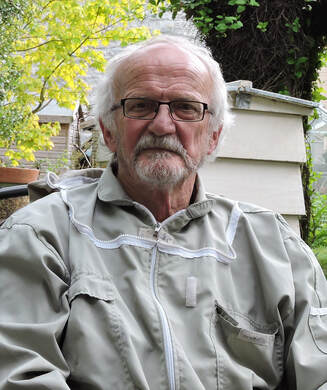 The Chairman of Somerset Beekeepers’ Association, Stewart Gould, is urging beekeepers to keep local honey bees and reject a campaign to overturn the recent ban on bee imports. “Locally bred bees are perfectly adapted for the conditions; imported bees carry the risk of pests and diseases and are genetically better suited to the country of origin,” he said. His comments follow media coverage of the new Brexit rules which have stopped the importation of honey bee colonies directly into the UK from the EU although queen bees are still allowed. HMRC is aware that there may be attempts to get around the import rules by using Northern Ireland as a back door but anti-avoidance measures are in place. “The importation ban is important and avoids the risk of bringing new problems to the UK’s bees. For example, bees in many areas of the country suffer from Chronic Bee Paralysis Virus which is associated with the importation of bees. And we are worried that the small hive beetle, which is in southern Italy, could come into the country and decimate our bees.” Somerset Beekeepers’ Association runs courses to help members to rear their own queen bees from successful colonies which ensures they are adapted to the conditions in their own area. Patrick Murfet from a beekeeping equipment company in Kent has started a petition calling on the government to reverse the new rules. The number of beekeepers continues to rise in the UK; membership of the British Beekeepers’ Association stands at more than 28,000 while Somerset’s is topping a record 1,200. Ends Somerset beekeepers are calling on the public to pick up their smart phones and help defend the county’s bees against dangerous Asian hornets.
“See it, snap it and send it!” said Lynne Ingram, co-ordinator of Somerset’s Asian hornet action teams. “We need the public’s help to save our bees from the Asian hornet which has been wreaking havoc through Europe since 2004,” added Lynne, a beekeeper with 30 honeybee colonies near Bridgwater. Asian hornet week – September 7-13 – is a key time to spot the yellow-legged insects whose sting can be fatal and their arrival decimate native pollinators. “Now is the time to spot the hornets so that their nests can be destroyed before they multiply. “If you see a hornet take a photo, send it to us and we’ll do the rest. Or use the official Asian hornet watch app and report it.” An Asian hornet (Vespa velutina nigrithorax) is about twice the size of a honeybee, has an orange face and a dark abdomen with a yellow fourth segment. Its thorax is entirely dark brown or black and velvety, and the insect has bright yellow tips to its legs. “The arrival of the hornet in Britain is especially bad news for bees - a favourite food source - and a single hornet can completely devastate a beehive, devouring up to 60 at a time.” In the autumn Asian hornets can be spotted on flowering ivy, fallen fruit and hawking honeybees outside their hives as well as catching other pollinators. Asian hornets have been spotted in the UK and are rampant on the Channel Islands after they were accidentally introduced into southern France from China. The University of Exeter is carrying our research into the impact Asian hornets are having on honeybees and other pollinators where they have become established. Research Fellow and behavioural ecologist Dr Peter Kennedy said: “Asian hornets are anticipated to be a significant mortality factor influencing a broad spectrum of insects, including honeybees, on top of existing stressors (habitat loss, disease, pollution, climate change, etc.) that already impact our beleaguered native pollinator community. “Worldwide, invasive non-native species are recognised as being a serious threat to biodiversity, and it is consequently important that we encourage the public to be informed, vigilant and proactive in reporting the presence of Asian hornets and other invasive species.” Report sightings to [email protected] or use the Asian hornet watch app. Photos, posters and even a colouring sheet to help identify the Asian hornet can be found on the Somerset Beekeepers’ website: https://www.somersetbeekeepers.org.uk/resources.html Ends Beekeepers across the South West are calling on the public to join their first Asian Hornet Spring Watch campaign over Easter.
The highly destructive Asian hornets (Vespa velutina Nigrithorax) start to emerge from hibernation in the next few weeks before building up their numbers in the summer. Somerset’s Asian hornet action team coordinator Lynne Ingram said they hoped people from across the county would take part: “Lockdown means that people will be spending more time in their gardens and on walks around their neighbourhood this Easter. “We would like people to look for Asian hornets on flowers such as camellias, trees that ooze sap and in sheltered spots like sheds and porches while keeping within government guidelines in relation to Covid-19.” Asian hornets have distinctive orange faces and yellow tipped legs and are smaller than the bright yellow striped European hornet. “If anyone sees an insect they think is an Asian hornet, check it out on the Asian Hornet Watch app which has an identification guide and lets you send in your sightings.” Beekeepers and conservationists hope to mobilise support from all over the region to prevent the destructive insects getting established in the UK where they will decimate populations of pollinating insects and honeybees. “Given the many pressures on our precious pollinators, including climate change, habitat destruction and pesticide use, it’s vital we do all we can to support them by reporting sightings,” she added. Somerset Beekeepers’ Association has many useful ID materials on its website including a children’s colouring-in sheet. https://www.somersetbeekeepers.org.uk/resources.html Asian hornets are a notifiable invasive species and should be reported immediately, preferably with a photo using:
Ends Notes to editors: Asian hornets (Vespa velutina nigrithorax) are slightly smaller than native European hornets and look like large black wasps with an orange face and yellow legs:
A single Asian hornet can kill 50 bees a day, with a nest containing up to 6,000 workers and up to 350 queens. In Jersey, France and large areas of Western Europe they are stripping the environment bare of insects before moving on to prey on managed honeybee colonies. Asian hornets are a notifiable invasive species and should be reported immediately with photo using:
Beekeepers from across the South West are getting ready to tackle the imminent threat of deadly Asian hornets ahead of the coming season following a training day held in Somerset.
Organised by Somerset and Devon Beekeepers’ Associations on behalf of the South West Beekeepers’ Forum, 150 beekeepers have returned to their beekeeping associations armed with the latest techniques to combat the insects which could decimate honeybees and other pollinators. Somerset’s Asian hornet action team co-ordinator Lynne Ingram said: “We are on the Asian hornet front line here in the South West and this training day was a great opportunity to prepare ourselves for the season ahead. “Asian hornets don’t respect boundaries so it was important to start preparing to work together across the region. Although it was mainly beekeepers who attended the event, one of the key messages to get across is that Asian hornets are not just a problem for beekeepers. “We now know that these hornets build nests in garden hedges, bramble patches, in holes in the ground and also on buildings. We will be working hard to educate the public so that everyone can recognise a hornet and report a sighting. With thousands of people looking out for them, we have some chance of slowing the invasion.” The day-long programme included presentations about the latest research from Dr Peter Kennedy of the University of Exeter and Alastair Christie, Jersey’s Asian hornet coordinator, who shared his experience tracking the non-native hornets on the Channel Islands. SWBKF Chair Peter Darley commented: “I certainly learned a lot from some very good speakers and workshops and came away with a far clearer idea on how to proceed in our preparations to fend off the coming invasion…All of us can learn from Somerset's lead and, as a Forum, we are lucky to have them and their experience to show us the way.” Asian hornets (Vespa velutina nigrithorax) have distinctive orange faces, yellow tipped legs and are smaller than the bright yellow striped European hornet. They are a notifiable invasive species and sightings should be reported immediately:
Ends Photos were taken at the Asian hornet training event held at Bridgwater, Somerset. Notes to editors: Somerset Beekeepers’ Association (SBKA) is a Registered Charity run by volunteers and works to advance the craft of apiculture within its membership and to promote general awareness and understanding of honeybees. SBKA has given all its members monitoring traps and identification materials and the county is covered by 12 Asian hornet action teams which are trained to help with identification and to assist bee inspectors with verifying and tracking sightings. Asian hornets are active mainly between April and November (peak August to September) and are inactive over the winter.
|
Archives
September 2023
Categories
All
|
Somerset Beekeepers Association Charity © 2021 Registered CIO Charity 1206483
Affiliated to the British Beekeepers Association
Click here to view our Privacy Policy
Affiliated to the British Beekeepers Association
Click here to view our Privacy Policy
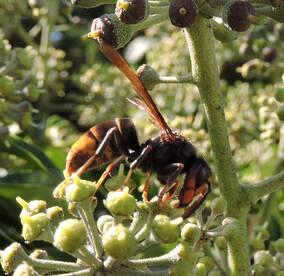
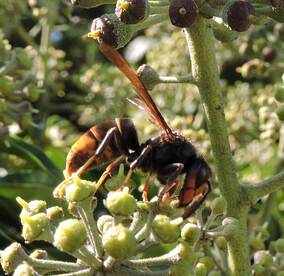
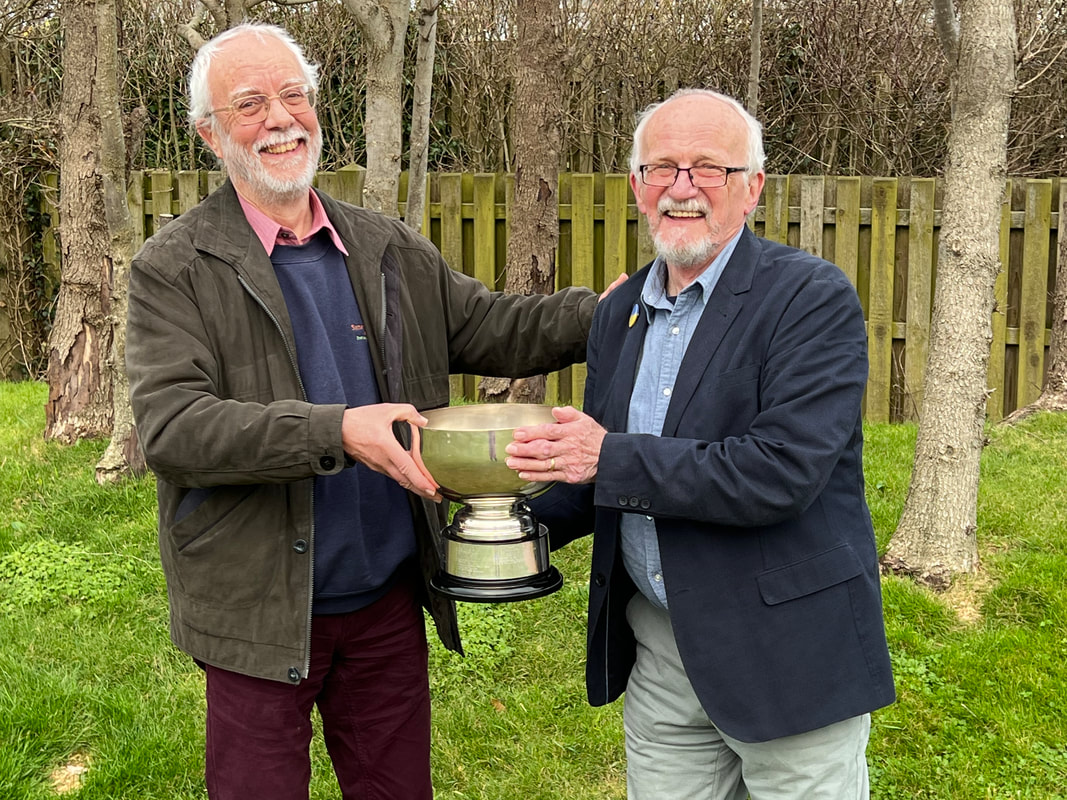
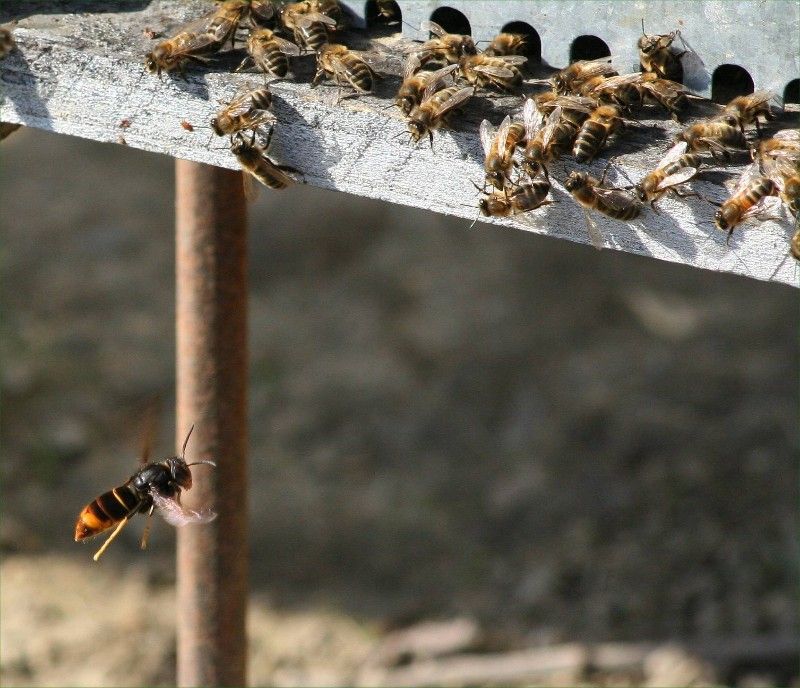
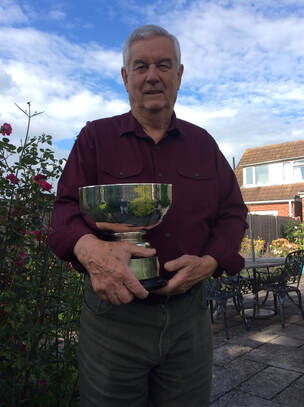
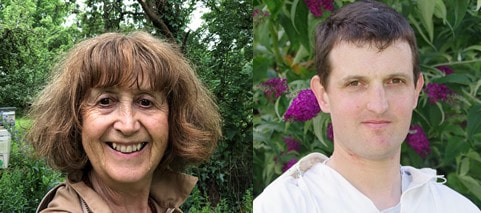
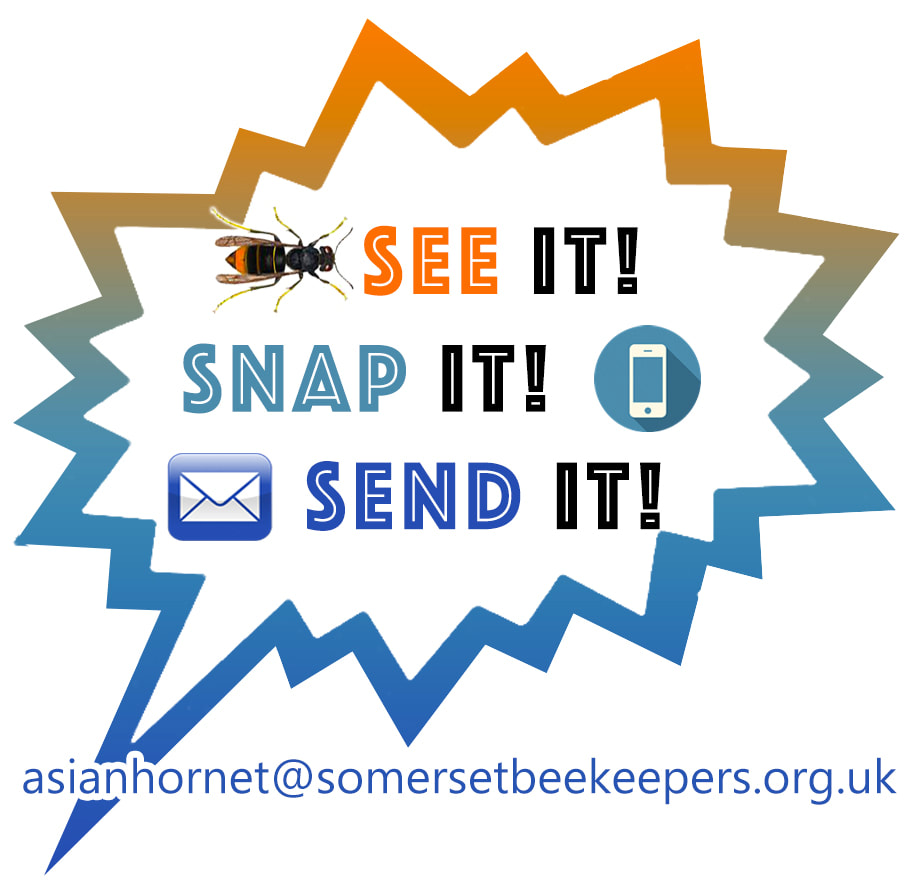
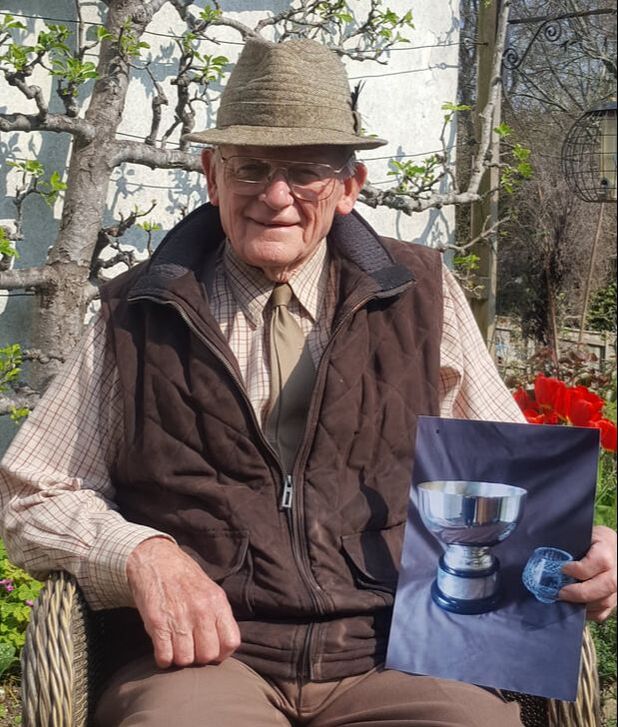
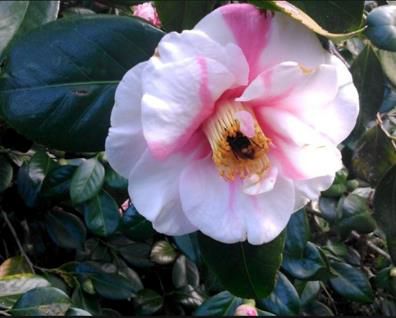
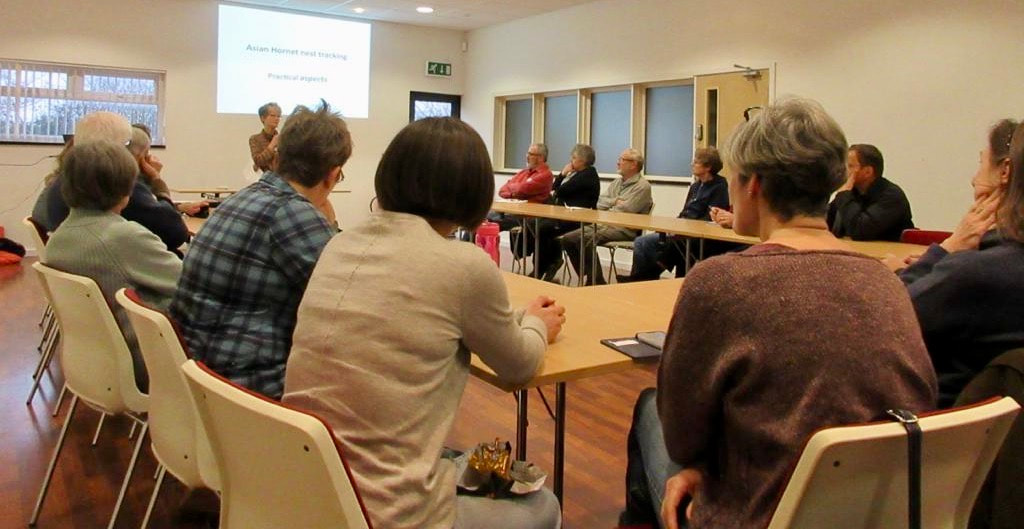
 RSS Feed
RSS Feed
